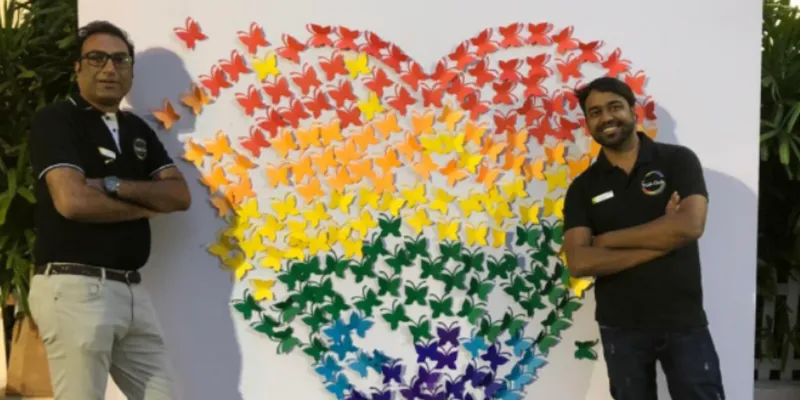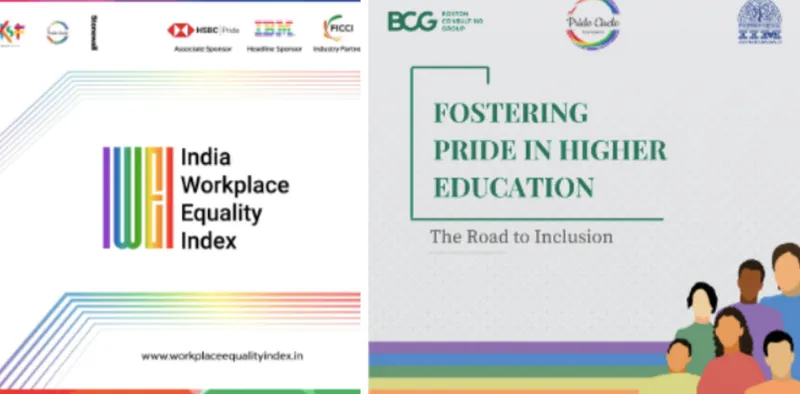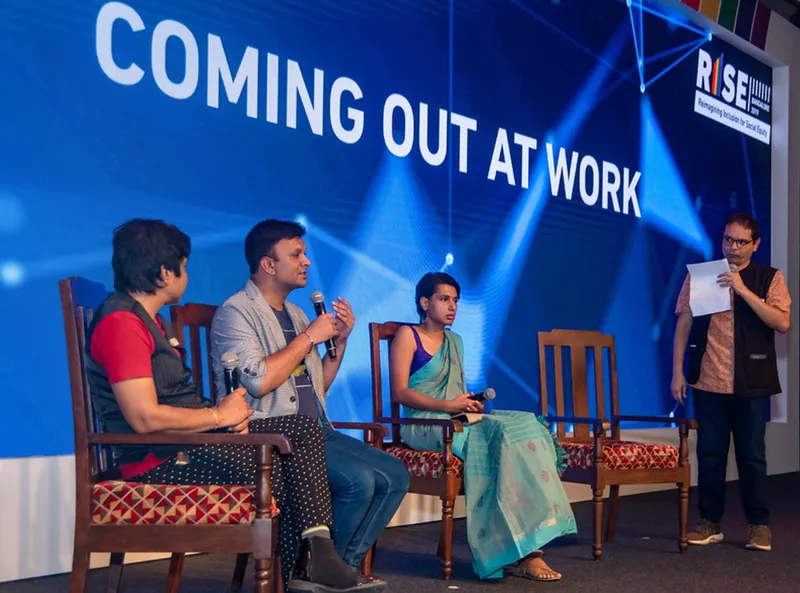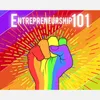[Queer Changemakers] How Pride Circle is bringing a culture transformation at the workplace
We are trying to build is safer, inclusive spaces where this conversation, acceptance, and identities are celebrated, says Co-founder Ramkrishna Sinha
Ramkrishna Sinha, Co-founder of , talks about creating demand for LGBTQ+ talent at all levels and ensuring inclusion at workspaces and campuses. Ram is a BITS Pilani engineer-turned-entrepreneur with over a decade of experience at Intel.
Having led the LGBT Employee Resource Group at Intel in India, Ram co-founded Pride Circle and built it over the last five years into one of India’s premier Diversity and Inclusion organisations.

Pride Circle Co-founders Srini Ramaswamy (left) and Ramkrishna Sinha
Tell us how Pride Circle is helping employers create more inclusive workspaces.
We launched the India Workplace Equality Index in 2020 in partnership with Stonewall and the Keshav Suri Foundation. Both my co-founder Srini and I come from a place of starting LGBT+ employee resource groups (ERGs) and bringing a culture transformation around a topic that was considered taboo and irrelevant in the workplace. That way, we were working with companies on sensitisation training and employee engagement. Then we forayed into the India Workplace Equality Index (IWEI) as a genuine benchmarking tool for companies to measure their progress.
People say, well we don’t have anyone ‘out’ in our company. I think that is one metric but not the only metric that needs to be tracked. If you look at the right data points, there’s enough information for you to measure inclusion correctly.
IWEI has nine sections including policies and benefits, employee engagement, role model allies, senior leadership, self ID, supplier diversity, community engagement and more. So, the idea is to look at some of the structural designs.
- Like, does an organisation have policies that start with basic things like non-discrimination? Do you cover transition insurance coverage?
- Do you have gender-neutral washrooms?
- If I have to change my name, are there templates available?
- Are you allowing people to self-ID beyond male and female?
- Are there Senior Leaders in the company who are out as allies? Is this cross-functional or is it just in the leadership?
- Do you have an ERG or other spaces for LGBT+ people to convene, and for allies?
- Is educational content available for all employees? We also look at how you engage with the external community. Are you engaging with your suppliers and vendors that they are LGBT+ inclusive?
- Are you consciously looking at doing some business with LGBT+ owned businesses?
- Are you using your social media and other levers to promote LGBT+ inclusion in society at large?
These questions set the agenda for the organisation because what gets measured, gets done.
How does the scoring work?
It’s a very comprehensive survey in that way, and we give them a score out of 100 so they can then improve on these aspects. The actual score is confidential and only for their team, what is made public is the band - gold, silver, bronze. Organisations also have a choice of participating anonymously if they feel they’re not ready to go public with this. This year, we are also introducing an employee section where employees of the company (both LGBT+ and non-LGBT+) will go ahead and fill a bunch of questions about how their experience has been about the LGBT+ community, access to information, opportunities to be an ally and so on. We will also be capturing input from employees.

India Workplace Equality Index (IWEI) is a benchmarking tool for companies to measure their progress in bringing a culture transformation around a topic that was considered taboo and irrelevant in the workplace.
How many companies currently take the IWEI audit? What are the industries covered?
Last year we had 72 companies, including the ones that took it anonymously. This audit takes them a couple of months to fill because they have to liaise with multiple teams like the legal team, the ERG, suppliers, the procurement team, etc. The HR or the DEI Team manages this mainly for their company. These are again companies across IT, FMCG, management consulting, and other industries.
Right now, the LGBT+ inclusion conversation is still very limited to the organised sector, largely foreign-based MNCs and then some Indian companies. I think even if you look at the organised sector, the majority of Indian companies still do not even engage in this conversation.
You also support entrepreneurs from the community. Tell us about the Rainbow Bazaar.
We focus on two aspects—one is employment, and the other is entrepreneurship. Either you find gainful work opportunities, or you become an entrepreneur yourself. The Rainbow Bazaar is something that we did as physical stalls and slowly developed it into an ecommerce marketplace where any LGBT+ person making a candle in a village can sell their product and earn through entrepreneurship. We support our entrepreneurs with a payment gateway, product photography, SEO, and other aspects based on where they are in their journey.
All our services are free for the community, be it the job fair, the skill-building workshops, or the listing of products on Rainbow Bazaar. We wanted to be mindful so that whoever has the drive to upskill themselves or launch their business does not face economic barriers.
What are common myths you come across in your work?
As far as corporate jobs are concerned, I can assure you there are jobs across the hierarchy. The whole mentality that these are only going to be entry-level jobs, that’s definitely not there.
But all hiring will be skill-based and education-based. I want to call out that no one should have any misinformation or misconception that you will get a job because you are LBGT+. What we are trying to build is safer, inclusive spaces where this conversation, acceptance, and identities are celebrated, but when it comes to working, you’ve got to have the right skillset.
Where do you see progress happening? Where do we need to be paying more attention?
Thankfully, in the last two years, we now have an out lesbian sports athlete. We have definitely seen more people in the industry, such as India Inc, coming out and in leadership. I think there are a lot more that need more visible representation because that definitely brings a lot of change. We’re seeing some good content coming out of Bollywood (finally!) and other movie industries. Badhaai Do is a good example. Your first thought is—once you get married, everything fixes itself, but a lavender wedding only prolongs the agony for everyone.
On the education front, we organised India’s first Pride in Education Summit and we are working with college campuses, including in Tier-II and III towns, to build the capacity of student-run Queer Collectives and Gay-Straight Alliances. This is another major milestone for us. We also published a Report with BCG and IIM Ahmedabad early last year, which looked at the landscape in higher education and that came with some really scary figures, to say the least. This data point really helps us to understand what is happening and only then do we look at the root cause and figure out solutions for it.
Overall, we need more upskilling and career pathways for the community and also a lot more people out across spaces. We also need more visibility and awareness in society.

A panel at the RISE Job Fair 2019
ALSO READ

What is the motivation behind the RISE Job Fair? And what has been the impact so far?
We really believe that people need financial autonomy. I can live my life on my terms if I am not financially dependent on others. Along with physical and emotional, financial well-being is critical for everyone. We have seen family acceptance and social acceptance change massively once you become a contributing member and people are dependent on you financially. So that’s the core idea.
A job fair exclusively for LGBT+ talent in India was unheard of. There were a lot of concerns and curiosity around it. People had not really seriously considered the LGBT+ talent pool. Candidates had questions like what kind of jobs will be there? Is it just entry-level jobs? Is it just Human Resources (HR), Diversity Equity and Inclusion (DEI) jobs? Companies had questions like: what kind of skills do people have? Over the last four editions of RISE, we have placed 500+ people in a range of sectors from IT, BFSI, manufacturing, FMCG, and Hospitality among others. We’ve placed people in Associate Director positions, and we’ve placed people as parking wardens. From 10th pass to PhDs, we’ve definitely traversed the length and breadth of the talent pool. Our next summit is being held on July 27th and we are accepting registrations on our website.
(Disclaimer: The views and opinions expressed in this article are those of the author and do not necessarily reflect the views of YourStory.)
Edited by Diya Koshy George
(Disclaimer: The views and opinions expressed in this article are those of the author and do not necessarily reflect the views of YourStory.)

![[Queer Changemakers] How Pride Circle is bringing a culture transformation at the workplace](https://images.yourstory.com/cs/5/f5a7f3304b1211e9b6645b8ae897d03e/Screenshot2022-06-21at1-1655800160704.png?mode=crop&crop=faces&ar=16%3A9&format=auto&w=1920&q=75)
![[Queer Changemakers] 'It will take another 25-30 years to get proper rights and mainstream visibility for the transgender community'](https://images.yourstory.com/cs/5/f5a7f3304b1211e9b6645b8ae897d03e/Screenshot2022-06-16at1-1655365734142.png?fm=png&auto=format&h=100&w=100&crop=entropy&fit=crop)




